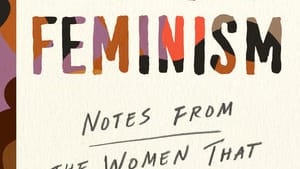Stay in the Loop
BSR publishes on a weekly schedule, with an email newsletter every Wednesday and Thursday morning. There’s no paywall, and subscribing is always free.
Is feminism the answer?
‘Hood Feminism: Notes from the Women that a Movement Forgot’ by Mikki Kendall

Hood Feminism is a political nonfiction book written by self-proclaimed feminist Mikki Kendall. On one hand, it is a powerful account of issues impacting marginalized women, particularly Black women from the “hood,” problems often neglected by people outside of these communities. On the other hand, it is begging for white validation and inclusion.
The issues Kendall describes are extremely valid. From hunger to housing insecurity, and murder to maternal mortality, they undoubtedly impact Black women at disproportionate rates. They are critical issues that deserve the utmost attention and should be addressed and eradicated. As a Black woman, I commend Kendall for giving voice to the circumstances many Black women face. However, is feminism, whether the “hood” version or any other considered to be more inclusive or progressive, the answer for Black women who seek full liberation?
Who is reading?
Of the questions that arise for me on seeing the title and reading the text, one of the biggest is: Who is Kendall’s intended audience? The title may lead you to believe that the book is intended for women from the hood—Black women from the hood. Kendall provides both data and personal narratives to describe the plight of these women and what they need, but chooses to do it from the perspective of a system that was designed for white women.
The author briefly mentions womanism in her introduction, stating that it is more inclusive than feminism, but still chooses to identify as a feminist. Womanism is a term coined by Alice Walker to describe the unique experiences of Black women, which is a goal of this text; yet Kendall examines the plight of her fellow women through the less progressive alternative of feminism. Not only is this seemingly contradictory, but it makes the informed and liberated Black woman reader wonder: Did Kendall know about Clenora Hudson Weems’s Africana Womanism or Nah Dove’s African Womanism? Because if she did, it would be hard to believe that such a research-based text as this would’ve still been looking for white women who are “willing to do the work.” Perhaps she uses “feminism” because white women are indeed the audience.
Waiting for white feminists
Moreover, the works of Weems and Dove address many of the issues Kendall brings up: the complexities of being a Black woman and living within a racist patriarchy. They provide solutions that are rooted in culture—solutions that liberate Black women and, in turn, all Black people. Unfortunately, the solution that Kendall calls for is to rely on white feminists to do more, which won’t liberate black women from the circumstances they face in the hood. Relying on feminism can only get Black women so far, if anywhere at all.
This is not to say that white women should not do “the work.” But the question is are they willing to do the work that Kendall is calling for, especially when doing this work requires the eradication of racism, a system that actually benefits white women?
The issues of gun violence, hunger, colorism, the missing and murdered, maternal mortality, and housing are all fundamentally caused by the system of racism. Feminism, too, was built by racism. White women (specifically middle-class white women) in the suffrage movement created feminism to combat the patriarchy. Not only did they disregard the issues impacting Black women; they didn’t even consider Black women to be women. Although feminism has evolved since the 18th century and considers itself to be more inclusive, the movement has evolved more in claims than in practice. Kendall herself highlights throughout the book that feminism is still missing the mark. So why continue to try to force a system to fit your needs when other movements have been created just for Black women by Black women?
The subtitle of the book is Notes from the Women that a Movement Forgot, but in the words of W.E.B. DuBois, “a system cannot fail those it was never meant to protect.” Feminism didn’t forget Black women. It was never intended for black women. Asking feminism to be effective and inclusive of most women, especially Black women, is asking feminism to be quintessentially unfeminist. It’s asking for the end of racism.
How can a movement built on racism solve issues caused by racism? It could, if its white members became actively antiracist and were willing to completely unravel racist structures, their own movement included. But in doing this, white women would be working against their own interests, and they’ve proved for nearly four centuries that they are not willing to do this. Walker, bell hooks, Weems, and Dove pointed this out decades ago. Are Black women in the hood expected to wait another century while white women consider doing “the work”? If not, why devote an entire book to this topic?
Asking for inclusion
In 2020, should Black women be putting their energy and resources into a movement that was never intended for them, asking for inclusion, and hoping that the issues that most impact them are validated by white feminists? Or should Black women be solving their issues on their own terms, from their own perspective, and liberating themselves? For centuries, Black women from Sojourner Truth and beyond have been agents in their own liberation, and this won’t change.
Ultimately, Kendall’s Hood Feminism would have been much more impactful had it addressed these questions, and had the primary audience been Black women. It could’ve provided Black women with an important dialogue on how to implement their own movements, like African womanism, into the hood, the suburbs, the country, and beyond—to solve the issues that uniquely impact them. Instead, the reader is left with yet another accommodationist text, yet another text centered on white women: making demands of them that will likely never reach fruition, regardless of how well-intentioned white feminists may claim to be.
What, When, Where
Hood Feminism: Notes from the Women that a Movement Forgot. By Mikki Kendall. New York: Viking, February 25, 2020. 288 pages, hardcover. Get it here.
Sign up for our newsletter
All of the week's new articles, all in one place. Sign up for the free weekly BSR newsletters, and don't miss a conversation.
 Lindsay Gary
Lindsay Gary